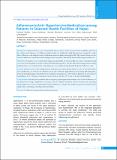Please use this identifier to cite or link to this item:
https://hdl.handle.net/20.500.14356/1053| Title: | Adherence to Anti- Hypertensive Medications among Patients in Selected Health Facilities of Nepal |
| Authors: | Khadka, Sushmita Maharjan, Anjana Bhardwaj, Manisha Jha, Anushree Bajracharya, Milan Lamichhane, Bikal |
| Citation: | KhadkaS., MaharjanA., BhardwajM., JhaA., BajracharyaM., & LamichhaneB. (2021). Adherence to Anti- Hypertensive Medications among Patients in Selected Health Facilities of Nepal. Journal of Nepal Health Research Council, 19(1), 83-86. https://doi.org/10.33314/jnhrc.v19i1.1395 |
| Issue Date: | 2021 |
| Publisher: | Nepal Health Research Council |
| Article Type: | Original Article |
| Keywords: | Adherence Hypertension Medication Patients |
| Series/Report no.: | Jan-March, 2021;1395 |
| Abstract: | Abstract Background: Hypertension is a non-communicable disease and one of the most prominent modifiable risk factors for cardiovascular diseases. 7.6 million premature deaths are attributed to high blood pressure around the world. Better adherence with antihypertensive medications improves quality and length of life. This research focuses on the extent of adherence towards prescribed antihypertensive treatment, and identify factors influencing non-adherence. Methods: Descriptive cross-sectional study design was undertaken in various health care centers (2 primary health care center and 3 hospitals) of Nepal. A total of 348 individuals (age above 30) who suffered from hypertension visiting health institutes were included in the study. Adherence was calculated using Morisky Medication Adherence scale. Results: Adherence level to the antihypertensive medication as per the morisky adherence scale, 38.8% had medium level of adherence, 37.4% had a low adherence level, and 23.9% had a high adherence level among 348 participants. From the total participants, 89 admitted to be irregular in medication use. 56% of them claimed to do so because of forgetfulness, 12.4 % because of consistent exercise and low-salt diet, 10.1% due to the lack of affordability. Conclusions: Our study had concluded that the majority of participants had medium to low levels of adherence to anti-hypertensive drugs. Forgetfulness was major cause for irregular medication. Patient education and counseling, family support also seem to be important for proper adherence to drugs. Thus, health care providers should allocate ample time in educating, counseling clients and family. Keywords: Adherence; hypertension; medication; patients |
| Description: | Original Article |
| URI: | http://103.69.126.140:8080/handle/20.500.14356/1053 |
| ISSN: | Print ISSN: 1727-5482; Online ISSN: 1999-6217 |
| Appears in Collections: | Vol. 19 No. 1 (2021): Vol. 19 No. 1 Issue 50 Jan-Mar 2021 |
Files in This Item:
| File | Description | Size | Format | |
|---|---|---|---|---|
| 1395-Manuscript-21554-1-10-20210425.pdf | Fulltext Article. | 218.34 kB | Adobe PDF |  View/Open |
Items in DSpace are protected by copyright, with all rights reserved, unless otherwise indicated.
